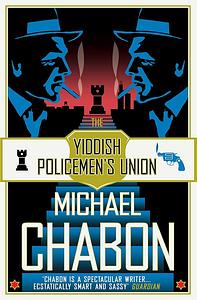Take a photo of a barcode or cover
dark
emotional
funny
mysterious
reflective
slow-paced
Plot or Character Driven:
A mix
Strong character development:
Complicated
Loveable characters:
Yes
Diverse cast of characters:
Yes
Flaws of characters a main focus:
Yes
Good mystery read though the ending was a little wonky. Quite disco elysium esque in terms of how the main character is.b
I appreciated the syntax and how the narration was similar to the way the protagonist speaks. I also liked the combination of the Tlingit and Jewish populations, although there was occasionally some tension between the two.
The mystery in the book unravels slowly and unexpectedly, although the ending of the main plotline felt somewhat unsatisfying.
I read this in audiobook form, and while the narrator had an appropriate older yiddish affect to his voice, I found him very hard to actively pay attention to. I feel like I would have appreciated this book more if I had read is physically.
The mystery in the book unravels slowly and unexpectedly, although the ending of the main plotline felt somewhat unsatisfying.
I read this in audiobook form, and while the narrator had an appropriate older yiddish affect to his voice, I found him very hard to actively pay attention to. I feel like I would have appreciated this book more if I had read is physically.
In packing for a camping trip to Michigan last week, I found myself torn between either starting Chandler's "The Big Sleep," or Chabon's "The Yiddish Policemen's Union." The choice seemed sharp-- on their face, the two books appear wholly different (mid-20th century hardboiled noir fiction v. 21st century alternative history fiction). This anticipated sharpness, however, was wrong--"The Yiddish Policemen's Union" is a clear ode to, and twist on, Chabon. The protagonist, Meyer Landsman, is a grizzled, lonely, and out-of-shape detective, always hustling to get his man, and never playing by the books. And, Chabon's dark, winter-time Sitka, Alaska, is as lonely and gritty a place as Chabon's sunny, superficial Los Angeles (both are, moreover, new and expansive frontiers in America).
Chabon's decision to craft a Chandler-like detective story in an alternative fictional universe where Jewish WWII refugees populate Alaska, is meant to be surreal, interesting, and fun. It feels kind of like a bit of a gimmick, but it works and makes the book memorable. Chabon's writing isn't as good as Chandler's, but it's still pretty good, and I enjoyed reading "The Yiddish Policemen's Union."
My one (large) criticism of the book is that, as in "The Amazing Adventures of Kavalier & Clay," Chabon ends "The Yiddish Policemen's Union" very suddenly (Chandler did the same thing in "The Long Goodbye," but to greater effect, I thought). Moreover, I felt like the ending--the explanation of the murder--did not make sense at all (what is the US' motive in helping the Alaskan Jews take Palestine? Maybe he included this twist to make a larger point, instead of to make a logical resolution). Normally, this would be a huge drawback for a book--but, "The Yiddish Policemen's Union" is fun to read; so much so, that I didn't really mind that the end didn't work.
Chabon's decision to craft a Chandler-like detective story in an alternative fictional universe where Jewish WWII refugees populate Alaska, is meant to be surreal, interesting, and fun. It feels kind of like a bit of a gimmick, but it works and makes the book memorable. Chabon's writing isn't as good as Chandler's, but it's still pretty good, and I enjoyed reading "The Yiddish Policemen's Union."
My one (large) criticism of the book is that, as in "The Amazing Adventures of Kavalier & Clay," Chabon ends "The Yiddish Policemen's Union" very suddenly (Chandler did the same thing in "The Long Goodbye," but to greater effect, I thought). Moreover, I felt like the ending--the explanation of the murder--did not make sense at all (what is the US' motive in helping the Alaskan Jews take Palestine? Maybe he included this twist to make a larger point, instead of to make a logical resolution). Normally, this would be a huge drawback for a book--but, "The Yiddish Policemen's Union" is fun to read; so much so, that I didn't really mind that the end didn't work.
This book took a very long time for me to finally get into and commit to reading. The language was a struggle and confused is not how I prefer to feel when reading.
That said, once I finally got into a groove and pushed through, the plot was interesting and I feel like this was ultimately a good experience even if I lost the trail several times along the way.
Also it took someone else literally telling me it was an alternative timeline for me to understand, which was helpful to find out, and completely my fault, I think.
That said, once I finally got into a groove and pushed through, the plot was interesting and I feel like this was ultimately a good experience even if I lost the trail several times along the way.
Also it took someone else literally telling me it was an alternative timeline for me to understand, which was helpful to find out, and completely my fault, I think.
'The Yiddish Policemen's Union' is premised on an interesting thought experiment. At some point in the 1930s, someone in US government floated the idea of allowing the Jews of Europe to relocate to Alaska. This was to be a win-win: it'd give those European Jews who were fleeing persecution someplace to go, and it'd pave the way for the exploitation of Alaskan resources and growth of the Alaskan economy. In real life, the idea never gained traction. But Chabon asks, "What if? What if Yiddish language and culture hadn't been decimated, but relocated? What would a Yiddish enclave in Sitka look like, a couple of generations in?"
'The Yiddish Policemen's Union' is more than a thought experiment, however. It's a commercially viable novel. That means the author needed a plot, and there's no more reliable plot generator than a broken down cop, a murder, and the involvement of some very powerful men.
The overall effect of this combination will, I think, depend on the reader's affinity for two things: Yiddish culture and mystery stories. As it happens, I'm not particularly interested in either. As someone who isn't a product of the Jewish diaspora, many of the book's cultural references flew right past me. As someone who is familiar with detective fiction (though it isn't my preferred genre), the mystery and its resolution struck me as pedestrian. There is, however, a third factor at play in any novel: the author's way with words. In that respect, author Michael Chabon is outstanding. He made me feel immersed in the alternate reality, the alternate culture, he'd created. He made me care about his detective's life, his relationships, his future. He made me forget that I was reading an imaginary travelogue and caught me up in the beauty of his prose.
If you're interested in Yiddish culture and/or you like detective fiction, I think you'll love 'The Yiddish Policemen's Union.' If not, I think you'll like it based on the strength of Chabon's writing alone. As for me, I enjoyed the ride.
'The Yiddish Policemen's Union' is more than a thought experiment, however. It's a commercially viable novel. That means the author needed a plot, and there's no more reliable plot generator than a broken down cop, a murder, and the involvement of some very powerful men.
The overall effect of this combination will, I think, depend on the reader's affinity for two things: Yiddish culture and mystery stories. As it happens, I'm not particularly interested in either. As someone who isn't a product of the Jewish diaspora, many of the book's cultural references flew right past me. As someone who is familiar with detective fiction (though it isn't my preferred genre), the mystery and its resolution struck me as pedestrian. There is, however, a third factor at play in any novel: the author's way with words. In that respect, author Michael Chabon is outstanding. He made me feel immersed in the alternate reality, the alternate culture, he'd created. He made me care about his detective's life, his relationships, his future. He made me forget that I was reading an imaginary travelogue and caught me up in the beauty of his prose.
If you're interested in Yiddish culture and/or you like detective fiction, I think you'll love 'The Yiddish Policemen's Union.' If not, I think you'll like it based on the strength of Chabon's writing alone. As for me, I enjoyed the ride.
I had a really hard time getting into this book. At first, it was the Yiddish that put me off.. there's a glossary at the back, but I didn't know that at the time and probably wouldn't have referred to it anyway since Chabon decided to throw in a Yiddish term every 5 words or so for the first six chapters. I think it was supposed to develop the setting, but it just made me feel like I was on the outside of a very exclusive club, looking in.
I stuck with it, and eventually that particular language barrier let up enough that I could follow the plot. It was okay, but better as a character study. I'm not generally a noir fan, but I did sort of fall for Landsman's character, and his interactions with Bina are pretty great.
That said, enter the second language challenge. Chabon is basically maximalist – like Gaiman or Neal Stephenson, his prose packs a whopping punch, descriptive and angsty, almost to a fault. It makes for super-quotable lines, and it's really fun to read aloud - but it's so over the top, it can come off as pulpy and actually detract from the story.
Personally, once I adjusted my expectations, I found I liked it, so for me: 4 stars (barely). But it's not for everyone.
I stuck with it, and eventually that particular language barrier let up enough that I could follow the plot. It was okay, but better as a character study. I'm not generally a noir fan, but I did sort of fall for Landsman's character, and his interactions with Bina are pretty great.
That said, enter the second language challenge. Chabon is basically maximalist – like Gaiman or Neal Stephenson, his prose packs a whopping punch, descriptive and angsty, almost to a fault. It makes for super-quotable lines, and it's really fun to read aloud - but it's so over the top, it can come off as pulpy and actually detract from the story.
Personally, once I adjusted my expectations, I found I liked it, so for me: 4 stars (barely). But it's not for everyone.
emotional
mysterious
reflective
slow-paced
Plot or Character Driven:
A mix
Strong character development:
Complicated
Loveable characters:
Complicated
Diverse cast of characters:
Yes
Flaws of characters a main focus:
Yes
It took me a while to get into this one, because the world building is so dense. But it really is immersive, and the author’s flair for metaphor and simile is so terrific, I often found myself going back to reread passages. Works as a mystery, as political commentary, and even has a little hint of second-chance romance. I enjoyed it.
This noirish mystery takes place in the fictitious Jewish settlement of Sitka, Alaska. It is an imagined world whose history includes an Arab takeover of Israel in 1948, the atomic bombing of Berlin, and a first lady known as Marilyn Monroe-Kennedy. This book has interesting ideas, fast chase scenes, and a likeable--though flawed--protagonist. But I found it a bit too long.
I loved 'The Adventures of Cavelier and Clay' (I should probably add it to my book list one day) and this won a Hugo award, so I thought I would read it, just to keep up with my quixotic endeavor to read every Hugo Winner, Nebula Winner, World Fantasy Award winner, James Triptree Jr. Award Winner, Philip K. Dick Award Winner, and Bram Stoker Award Winner.
It was good. The writing was amazing, and its interesting to learn about an imaginary Jewish/Alaskan culture. But it is *just barely* science fiction/fantasy/horror and I am not convinced that it should have been in the running for a Hugo. Because it was a hugo winner, I expected more wonder. I would rather of had 'The Brief and Wonderous Life of Oscar Wow' nominated for the award (I should write a review of that book and add it to good reads too...)
It was good. The writing was amazing, and its interesting to learn about an imaginary Jewish/Alaskan culture. But it is *just barely* science fiction/fantasy/horror and I am not convinced that it should have been in the running for a Hugo. Because it was a hugo winner, I expected more wonder. I would rather of had 'The Brief and Wonderous Life of Oscar Wow' nominated for the award (I should write a review of that book and add it to good reads too...)
dark
slow-paced
Plot or Character Driven:
A mix
Strong character development:
No
Loveable characters:
Complicated
Diverse cast of characters:
No
Flaws of characters a main focus:
Yes
This book may be better suited to paper than to audiobook. The story frequently goes into tangents that don't seem to really add anything to the overall narrative and often make you forget what the main thread was.
As for the categorization of the book, I guess the sci-fi tag is mostly because it's an alternative reality story. It's meant to be a mystery book (in fact it was recommended as a read through a mystery book club), but I feel like the "mystery" is such a small part of the narrative that barely drives the story that half the time I forgot that there was supposed to be a murder to solve.
The book is more of a general cop fiction, a murder just happens to be the inciting crime. The murder mystery itself didn't provide me with any satisfaction or sense of payoff at all. The main themes throughout the book are really more about Landsman, his failed marriage, and the state of the Jewish settlement of Sitka and the threat of the community getting displaced.
If you're looking for a book that delves into religious speculation and politics, this isn't a bad one. However, if you're looking for a mystery book, this may not fully scratch that itch.
As for the categorization of the book, I guess the sci-fi tag is mostly because it's an alternative reality story. It's meant to be a mystery book (in fact it was recommended as a read through a mystery book club), but I feel like the "mystery" is such a small part of the narrative that barely drives the story that half the time I forgot that there was supposed to be a murder to solve.
The book is more of a general cop fiction, a murder just happens to be the inciting crime. The murder mystery itself didn't provide me with any satisfaction or sense of payoff at all. The main themes throughout the book are really more about Landsman, his failed marriage, and the state of the Jewish settlement of Sitka and the threat of the community getting displaced.
If you're looking for a book that delves into religious speculation and politics, this isn't a bad one. However, if you're looking for a mystery book, this may not fully scratch that itch.
Moderate: Miscarriage, Murder
Minor: Homophobia, Sexism, Suicide





